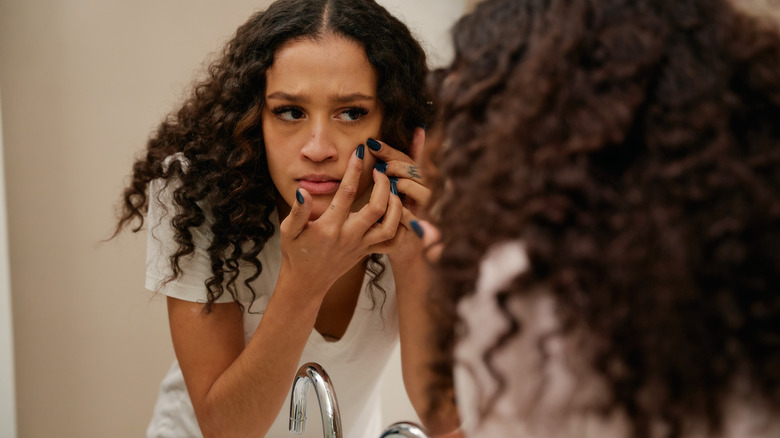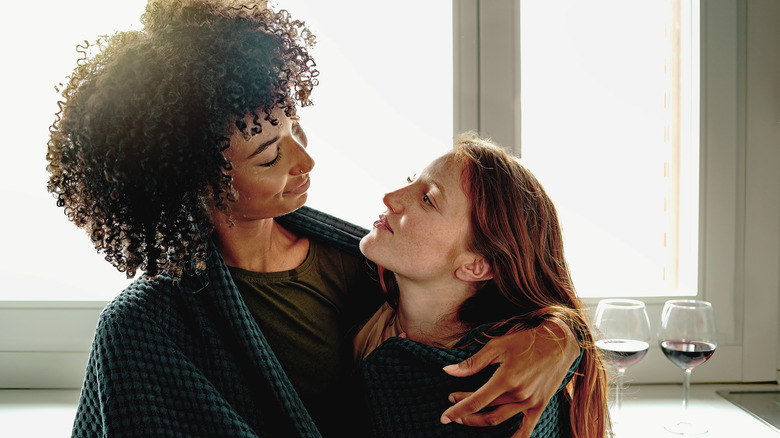Psychologist Tells Us If The Viral Boyfriend Effect Is Actually Real
Let's be honest: relationships change us. One week, you're someone who's never once watched sports, the next, you're at every tailgate party. Or maybe you're the person who was a carnivore your entire life and changed their mind after falling in love with a vegetarian. The point is, no matter how set we are in our ways, sometimes all it takes is for someone special to enter our lives to flip it upside down. Next thing we know, our friends are telling us "you've changed," forcing us to grapple with the person we were before the relationship. . In some cases, those changes are for the better, but in others, not so much.
Across TikTok, women have been documenting their experiences with a phenomenon called 'the boyfriend' effect, a term that describes how one's behaviors and appearance change after they begin spending time with their partner. This includes everything from becoming more lax with hair and makeup to picking up totally new habits and interests. Though on the surface, it doesn't sound like a bad thing, many of the videos would have you believe otherwise. Several clips, for instance, imply that the woman looked more put-together and happy when they were still single, while being with a man made them sloppy and careless.
With over 10 million views on the boyfriend effect hashtag and counting, it's clear many women agree this is a common experience. The fact that so many women have claimed to share the same problem begs the question: Is it possible that this is just an inevitable part of dating? Or is it just another TikTok trend people are following to fit in? To see if there was any legitimacy to the boyfriend effect claims, Women exclusively spoke to licensed clinical psychologist and therapist Dr. Yuko Hanakawa, PhD.
There's some legitimacy to the boyfriend effect
The term 'boyfriend effect' may not be anywhere in a psychology textbook, but that doesn't mean what people are describing is any less legitimate an experience. "Changes in personal habits and interests can occur in the context of a new relationship, often as a natural part of the adjustment process," NYS licensed clinical psychologist Dr. Yuko Hanakawa, PhD exclusively tells Women. Indeed, research confirms this to be true. According to a 2023 study published in the European Journal of Personality, when people get into a new relationship, it's common for their personalities to change.
Modifying your interests can happen to anyone of any gender, and Dr. Hanakawa elaborates that it all has to do with the desire for approval. We want our partners to like us, so of course we're going to take an interest in things they like, or attempt to learn about it. However, the phenomena that heterosexual women are experiencing may have more to do with subconsciously adhering to certain beliefs about playing a supporting role in the partnership. Factor in the gendered expectation that men hold the power in a relationship, and that dating is a 'competition,' and that's how you end up with women giving up the old versions of themselves and behaving like their boyfriends.
"Culturally, women might feel pressured to conform to their partner's interests, while men might feel encouraged to demonstrate more confidence and attention to their appearance," Dr. Hanakawa says. This explains the opposite phenomenon some TikTokers have dubbed the "girlfriend effect," which is where men are perceived as more attractive after they get a girlfriend. But it's not always a conscious thing. It's possible the girlfriend's style choices influenced him, or maybe she starts buying clothes for him, which can signal to other women that he's working on himself. No matter how hard we may try to fight against it, we're still the product of our culture. "It's a complex interplay of personal, societal, cultural, and relational dynamics," said Dr. Hanakawa.
What the boyfriend effect looks and feels like
Of course, it's important to remember that picking up your partner's habits isn't always a bad thing. Nor does it mean there's anything wrong with you or your relationship. Dr. Yuko Hanakawa, PhD exclusively tells Women that taking on your partner's interests "could be a sign of deep engagement and emotional investment." However, they add, "It's important to differentiate between normal adaptability in a relationship and losing one's sense of self."
Some tell-tale signs that you may have crossed that line are living in your boyfriend's tee shirt for weeks instead of getting dressed, not showering as often as before, and generally, putting in less effort into your personal care. While TikToker Couples.ish labeled this as letting yourself go, more than anything, it's that your routine has been disrupted by your new partner and it shows. And although there's nothing wrong with deciding to no longer wear makeup or becoming more casual with your style, there's a line between no longer trying as hard because you're comfortable, and completely neglecting your own care. After all, you can't abruptly stop a daily 10-step skincare regiment and not suffer the consequences.
But the signs aren't always physical. According to TikToker couples.ish, another indication you've fallen victim to the boyfriend effect is if you go along with everything your boyfriend says or wants without questioning it, or do things you disagree with to make them happy. This is a flag because it indicates your priorities have shifted to do anything to preserve the relationship, even if it's not necessarily healthy for you. At that point, it may be time to do a personal check in to see if it's what you truly want.
What should you do if you think you're experiencing the boyfriend effect?
Falling in love messes us up. Not only has research found that romantic love affects the brain the same way cocaine does, but early in a relationship we really struggle to think clearly. "The feeling of being in love takes up a lot of mental space and even dampens our cognitive functioning — at least temporarily," licensed psychotherapist Dr. Marni Feuerman tells Business Insider. "This certainly isn't good for our insight or judgment." But just because we're fumbling through the adjustment period, doesn't mean we need to lose ourselves in the process.
As NYS licensed clinical psychologist Dr. Yuko Hanakawa, PhD exclusively tells Women, "It's vital to maintain balance and ensure that personal values and interests are not entirely sidelined as such imbalance of attention and care is not sustainable in the long run." A mutual respect for individuality and a fair amount of interdependence are essential to a healthy relationship. To keep the balance, Dr. Hanakawa suggests addressing the loss of identity when it starts to become apparent. "It's crucial to engage in self-reflection and open communication ... Revisiting one's interests, spending time alone or with friends, and setting boundaries can help maintain a healthy sense of self."
While bringing someone new into our life can be exciting and even all-consuming, we need to remember that they like us for who we are — not a version of them we become. It's also important to understand that not everyone will experience the boyfriend effect. "[It] can highlight common experiences, [but] each relationship should be viewed in its own context," said Dr. Hanakawa. In other words, the boyfriend effect doesn't define the legitimacy of your relationship.



